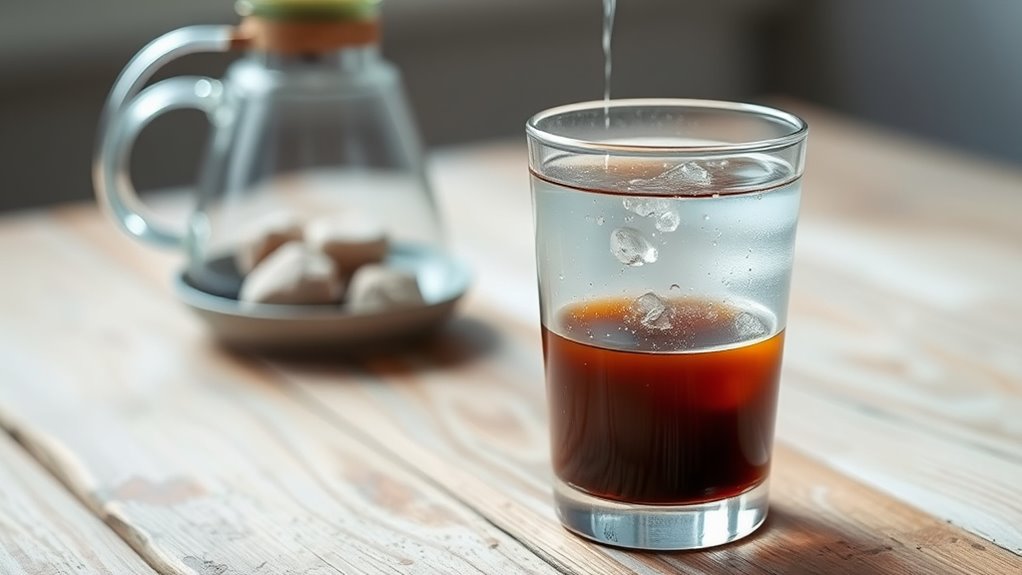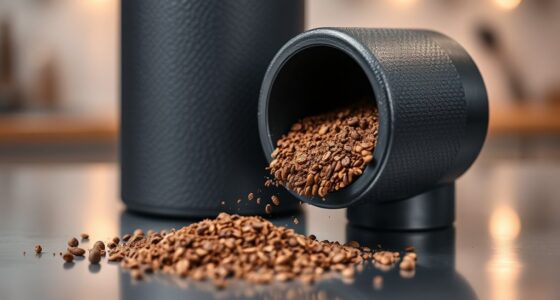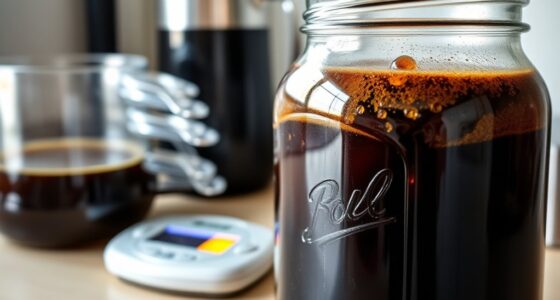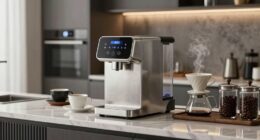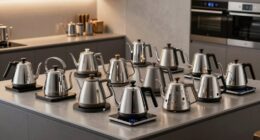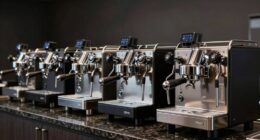To get the best flavor from your cold brew, use water with balanced minerals like calcium and magnesium, ideally around 150 ppm. Make sure the water’s pH is neutral or close to it, as too acidic or alkaline water can cause off-flavors or dullness. Proper water quality will highlight your coffee’s natural richness and prevent bitterness or flatness. If you’re curious about fine-tuning your brew, there’s more to discover about mineral and pH balance.
Key Takeaways
- Proper mineral levels (~150 ppm) in water enhance cold brew flavor and extraction efficiency.
- Excess minerals can cause bitterness, while too few lead to flat, dull flavors.
- Neutral pH (~7) promotes balanced extraction of aroma and taste compounds.
- Acidic water (pH below 7) may produce sour, sharp flavors; alkaline water (pH above 7) can cause dullness.
- Using filtered or bottled water with balanced minerals and pH ensures optimal cold brew quality.
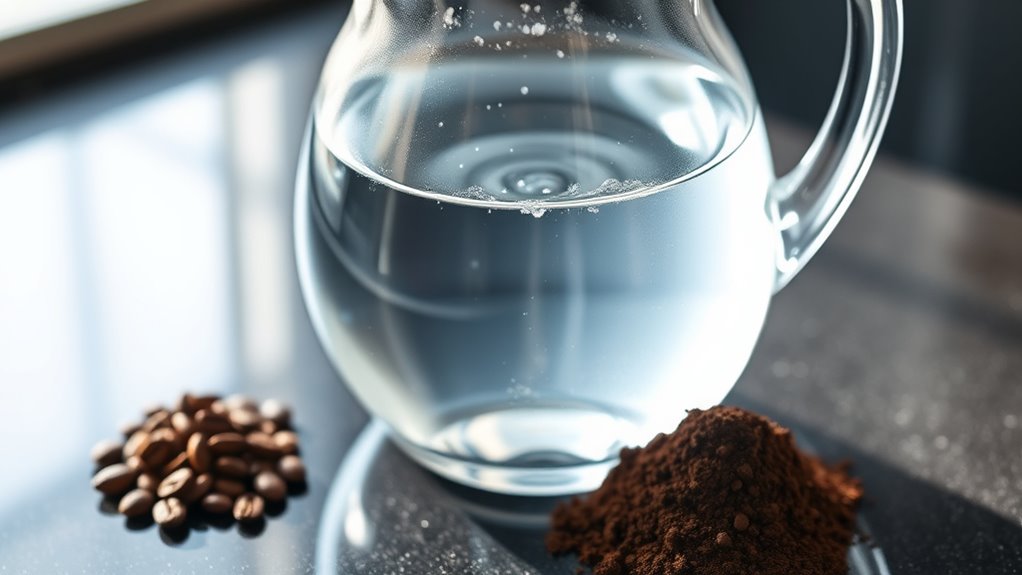
Have you ever wondered how water quality impacts the taste of your cold brew? The answer lies in the water’s mineral content and pH levels, which play pivotal roles in extracting flavors from your coffee beans. When you brew cold brew, the water acts as the solvent that pulls out oils, acids, and other compounds that shape its flavor profile. If your water has undesirable mineral levels or an imbalanced pH, it can lead to a bitter, flat, or off-tasting brew, making the difference between a mediocre cup and a truly exceptional one.
First, consider water mineral content. Minerals like calcium, magnesium, and trace elements influence how water interacts with coffee grounds. Proper mineral levels enhance extraction, producing a well-rounded, flavorful cold brew. Too many minerals, especially hardness-causing ones like calcium and magnesium, can cause over-extraction, leading to a bitter or astringent taste. Conversely, water with too few minerals might result in under-extraction, producing a bland or flat flavor. Striking the right balance is key. Ideally, your water should contain moderate mineral content—enough to support proper extraction without overpowering the delicate flavors of your coffee. Many baristas and coffee enthusiasts recommend water with a mineral content around 150 parts per million (ppm) for ideal extraction.
Next, water pH levels greatly influence the extraction process. Water with a neutral pH of around 7 is generally ideal. If your water is too acidic (pH below 7), it can lead to increased extraction of undesirable compounds, resulting in a sour or overly sharp flavor. On the other hand, alkaline water (pH above 7) might cause under-extraction, leaving your cold brew tasting dull or flat. Proper pH balance ensures that the coffee’s aroma and flavor compounds are extracted evenly, highlighting the coffee’s natural sweetness, acidity, and body. If your tap water skews outside this range, consider using filtered or bottled water with a balanced pH to improve your cold brew’s taste.
Frequently Asked Questions
How Does Water Temperature Affect Cold Brew Extraction?
You’ll find that water temperature directly impacts cold brew extraction because it affects water solubility and temperature stability. Cooler water slows down extraction, resulting in a smoother, less bitter flavor, while warmer water speeds up extraction, releasing more compounds quickly. Maintaining a consistent temperature guarantees stable extraction, giving you a balanced, flavorful cold brew. So, controlling temperature helps you achieve the perfect taste and consistency every time.
Can Bottled Mineral Water Improve Cold Brew Flavor?
Boost your brew with bottled mineral water for better flavor. By balancing minerals and ensuring water purity, you enhance your cold brew’s taste and aroma. Mineral balance prevents bitterness, while pure water keeps unwanted impurities out. You’ll notice a richer, more refined flavor, making each sip satisfyingly smooth. So, choose mineral water to maximize your cold brew’s potential—perfectly pure, precisely powerful, and deliciously delightful.
What Ph Level Is Ideal for Cold Brew Water?
You should aim for a pH level around 7 for your cold brew water, as it provides the ideal pH balance and water alkalinity. This neutral pH helps extract flavors smoothly without introducing sourness or bitterness. Using water with proper alkalinity supports ideal brewing, enhances the taste, and prevents over-extraction. Check your water’s pH regularly to confirm it stays within this range for the best cold brew experience.
Are There Specific Mineral Ratios Recommended for Best Cold Brew Taste?
Think of your cold brew as a symphony, where mineral balance sets the harmony. For the best taste enhancement, aim for a balanced ratio of calcium, magnesium, and sodium. Too much calcium can dull flavors, while magnesium boosts brightness. Keep sodium moderate to avoid overpowering. By fine-tuning these ratios, you’ll craft a smooth, vibrant cold brew that sings with every sip.
How Does Water Hardness Influence Cold Brew Acidity?
Water hardness, which reflects mineral content, directly influences cold brew acidity by affecting its pH balance. Higher mineral content typically results in harder water, which can neutralize acidity and produce a smoother, less tangy flavor. Conversely, softer water with lower mineral levels tends to preserve or enhance acidity, giving your cold brew a brighter, more vibrant taste. Adjusting water hardness helps you control the overall flavor profile and acidity of your brew.
Conclusion
Think of your cold brew as a portrait—water is the blank canvas. When you choose minerals wisely, you’re painting with vibrant, rich colors that bring out the depth and character of your brew. Poor water quality is like smudges and dull hues, dulling the masterpiece. By paying attention to minerals and taste, you’re not just brewing coffee; you’re crafting a liquid masterpiece that dances on your palate like a symphony of flavors.
